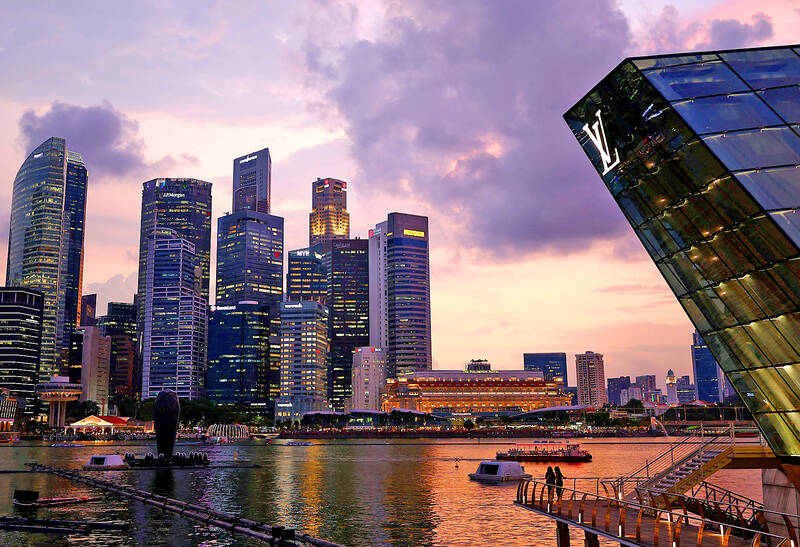Singapore remains the most expensive city in the world for spending on luxury goods such as jewelry and shoes and services including dining, healthcare and education.
Rival Hong Kong climbed one spot from last year to second, while London rose one place to third, an annual report by Swiss wealth manager Julius Baer Group Ltd showed.
Singapore has continued to attract the ultra-wealthy by maintaining its reputation for political and economic stability, alongside a pro-business environment. Hong Kong is the most expensive territory on the list for engaging a lawyer and the second most for buying property.

Photo: Reuters
London rose partly on the strength of the pound and “some normalization” post-Brexit.
Meanwhile, Shanghai dropped to fourth, likely due to challenges in the real-estate market and softening consumer confidence, the report said.
Tokyo plummeted to 23rd due to the weakening yen.
Many of the biggest changes in the index are due to currency fluctuations as index prices are converted to US dollars for global comparison, the report said.
Santiago is now a more expensive place to live than Tokyo in US dollar terms — a situation that would once have been “unimaginable,” it said.
Zurich climbed to sixth and was the year’s biggest gainer, largely due to the strength of the Swiss franc.
Julius Baer’s Lifestyle Index ranks the world’s 25 most expensive cities by analyzing residential property, vehicles, business-class flights, school, degustation dinners and other luxuries. The bank surveyed high-net-worth individuals with bankable household assets of US$1 million or more from February to March.
Europe, the Middle East and Africa went from being the most affordable region last year to the most expensive, with “significant price increases” and every European city moving up the rankings. Strong exchange rates prompted a change in the region’s fortunes.
There are “pockets of affordability” in Europe, according to the report.
The region is the cheapest place to buy champagne and whiskey, while France is home to the Champagne region and Scotland boasts more distilleries than anyone else, it said.
Dubai dropped to 12th from seventh last year, and while Singapore and Hong Kong took the top spots, other Asian cities, notably Tokyo, Bangkok and Jakarta fell in the rankings.
In Singapore, wealthy individuals are favoring “discreet over more overt expressions of wealth,” with sales of watches, cars, apartments and other luxury goods dropping.
Overall, price increases slowed to 4 percent from 6 percent last year across the index of goods and services.
The cost of bicycles fell nearly everywhere, almost certainly due to a glut of bikes after the COVID-19 pandemic, while other areas that dropped included business-class flights, with travel returning to normal after post-pandemic demand sent prices skyrocketing, the report said.
Jewelry, ladies’ shoes and men’s suits showed the biggest gains.

The Eurovision Song Contest has seen a surge in punter interest at the bookmakers, becoming a major betting event, experts said ahead of last night’s giant glamfest in Basel. “Eurovision has quietly become one of the biggest betting events of the year,” said Tomi Huttunen, senior manager of the Online Computer Finland (OCS) betting and casino platform. Betting sites have long been used to gauge which way voters might be leaning ahead of the world’s biggest televised live music event. However, bookmakers highlight a huge increase in engagement in recent years — and this year in particular. “We’ve already passed 2023’s total activity and

Nvidia Corp CEO Jensen Huang (黃仁勳) today announced that his company has selected "Beitou Shilin" in Taipei for its new Taiwan office, called Nvidia Constellation, putting an end to months of speculation. Industry sources have said that the tech giant has been eyeing the Beitou Shilin Science Park as the site of its new overseas headquarters, and speculated that the new headquarters would be built on two plots of land designated as "T17" and "T18," which span 3.89 hectares in the park. "I think it's time for us to reveal one of the largest products we've ever built," Huang said near the

China yesterday announced anti-dumping duties as high as 74.9 percent on imports of polyoxymethylene (POM) copolymers, a type of engineering plastic, from Taiwan, the US, the EU and Japan. The Chinese Ministry of Commerce’s findings conclude a probe launched in May last year, shortly after the US sharply increased tariffs on Chinese electric vehicles, computer chips and other imports. POM copolymers can partially replace metals such as copper and zinc, and have various applications, including in auto parts, electronics and medical equipment, the Chinese ministry has said. In January, it said initial investigations had determined that dumping was taking place, and implemented preliminary

Intel Corp yesterday reinforced its determination to strengthen its partnerships with Taiwan’s ecosystem partners including original-electronic-manufacturing (OEM) companies such as Hon Hai Precision Industry Co (鴻海精密) and chipmaker United Microelectronics Corp (UMC, 聯電). “Tonight marks a new beginning. We renew our new partnership with Taiwan ecosystem,” Intel new chief executive officer Tan Lip-bu (陳立武) said at a dinner with representatives from the company’s local partners, celebrating the 40th anniversary of the US chip giant’s presence in Taiwan. Tan took the reins at Intel six weeks ago aiming to reform the chipmaker and revive its past glory. This is the first time Tan